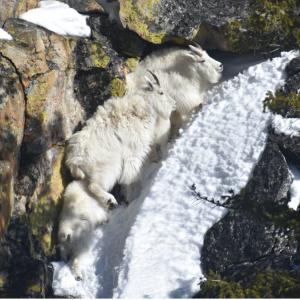NC CASC Webinar Series: "Demographic uncertainty and disease risk drive climate-informed mountain goat management" Thursday, April 8th, 2021
Date
NC CASC Webinar Series: Demographic uncertainty and disease risk drive climate-informed mountain goat management
Date: Thursday, April 8, 2021, 11a -12p MDT
Presented by: Justin Gude, Wildlife Research & Technical Services Bureau Chief, Montana Fish, Wildlife & Parks
Register in advance for this meeting:
https://cuboulder.zoom.us/
After registering, you will receive a confirmation email containing information about joining the meeting.
Abstract:
Concerns about mountain goats have arisen in many areas in recent years. Climate change may negatively affect this alpine ungulate, and recent evidence indicates that mountain goats harbor respiratory pathogens associated with pneumonia epidemics in bighorn sheep. Mountain goat demographic and population data are difficult to collect and sparsely available, exacerbating these concerns. We used a structured decision making process to address these issues and uncertainties, building from a successful track record of using this approach to make management program decisions in Montana, USA. Our analysis predicted that translocations to establish new mountain goat populations would result in more area occupied by mountain goats at mid-century, regardless of the effects of climate change. We found that various management actions may improve population trends, although this was associated with considerable uncertainty. Value of information analyses revealed that more information about population dynamics, the presence of pneumonia-associated pathogens, and the consequences of mixing microbial communities during translocations will affect choices among alternative management actions. Optimal management choices also varied by individual risk tolerance for disease transmission, because translocations are expected to increase disease risks for mountain goats and sympatric bighorn sheep. We recommend that managers determine the tolerance for disease risks associated with translocations that they and constituents are willing to accept. From this, an adaptive management program can be constructed wherein a portfolio of management actions are chosen based on risk tolerance in each population, combined with the amount that uncertainty is reduced when paired with monitoring, to improve mountain goat conservation efforts.
About the speaker:
Justin Gude has been the Wildlife Research & Technical Services (RTS) Bureau Chief for Montana Fish, Wildlife & Parks (FWP) since 2008. The RTS Bureau consists of wildlife research, health, biometrics, and survey programs, and their work covers a variety of taxa ranging in size from songbirds and bats to moose, in all corners of the state. Justin is responsible for overseeing the work of the RTS Bureau as well as ensuring integration of the wildlife research and management programs at FWP, so he is often involved in facilitating working groups such as that described in this presentation. He completed the U.S. Fish & Wildlife Service Decision Analysis Certification Program and has been involved in many structured decision-making processes, and he also is on the NC CASC- USDA Northern Plains Regional Climate Hub Joint Stakeholder Committee.
Past NC CASC Webinar Recordings: https://nccasc.colorado.edu/
Dates for future NC CASC webinars:
April 8, 2021, 11a-12p MDT
May 13, 2021, 11a-12p MDT
June 10, 2021, 11a-12p MDT
July 8, 2021, 11a-12p MDT
August 12, 2021, 11a-12p MDT
September 9, 2021, 11a-12p MDT
October 14, 2021, 11a-12p MDT
November 11, 2021, 11a-12p MST
December 9, 2021, 11a-12p MST


